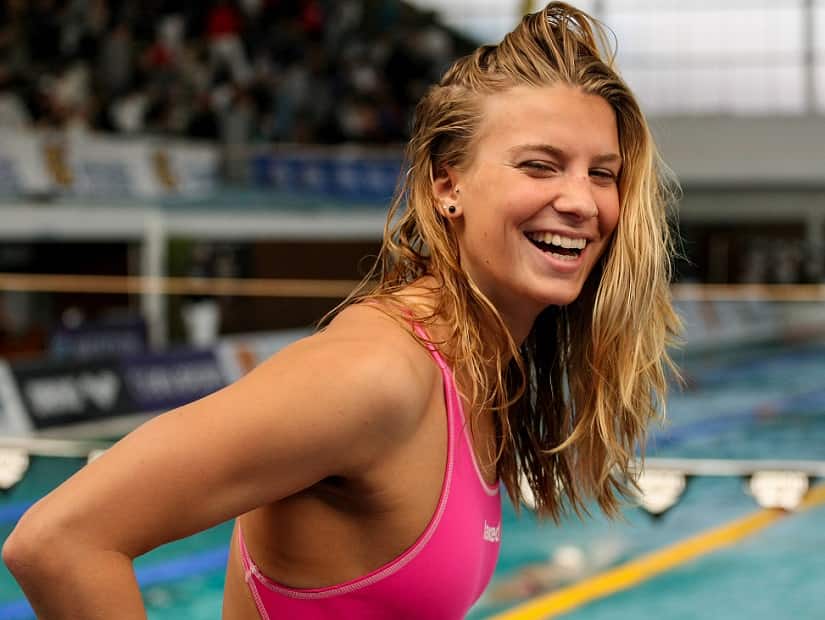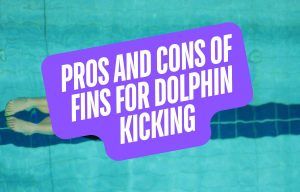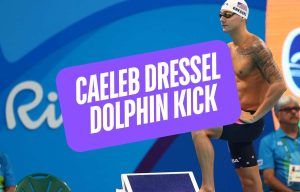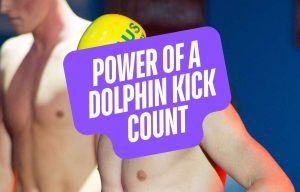Having a better attitude helps you face adversity, be more coachable, and of course, swim faster. Here’s a few things swimmers can do to improve their attitude.
Your attitude can be your greatest asset…or your biggest liability.
From the way you react to moments of adversity in training and in competition, to how you decide to face that “impossible” main set, your attitude says everything about you and your swimming.
You can tell a lot about swimmers just by watching the way they react to trying moments in competition and practice. The body language they use, the look in their eyes, the conversation they have with their coaches and teammates.
Often before they even get in the water you know which swimmer is going to put in a full effort, and which ones will sandbag the whole swim practice.
It’s all there, plain as day, reflected in their attitude.
Your attitude is how you feel and act towards something. Which in turn affects your behavior. Put another way, the way you feel about something is how you end up reacting towards it.
- That tough set? The bad body language, the grumbling, the giving-up-before-even-starting—that’s attitude.
- Losing at the wall? Sulking, deciding the rest of the meet is wasted—that’s attitude.
- Not picking up on the technical instruction fast enough? Deciding to try it one more time, and then again and again—that’s attitude.
- Showed up late to practice? Staying ten minutes after to finish the main set, and doing it without any supervision—that’s attitude.
While some swimmers seem to instinctively have a more effective attitude than others, there are some things you can do to create an environment where your attitude improves.
1. Surround yourself with like-minded swimmers.
“How can you expect to fly with eagles when you hang out with turkeys?”
This was one of the most common coachisms I heard growing up. It didn’t make a lot of sense at the time, because I love eating turkey, and eagles, well, they are all sorts of badass. But the sentiment is a legit one: hanging out with people and swimmers with low grade attitudes will rub off on you.
When the people you hang out with ditch early morning workouts, eat like dumpsters, and don’t take the main sets seriously it becomes a whole lot easier to start making those choices yourself. Your social circle has justified it, after all.
But if you hang out with swimmers who have high standards for themselves and their swimming, you cannot help but be dragged along by the power of their wake.
You can swim with sharks, or you can swim with donkeys. Or something.
2. Reframe your setbacks.
Coming up short on our goals sucks. Experiencing another bout of swimmer’s shoulder sucks. Having a swimmer who we used to soundly beat all the time suddenly grow half a foot over the summer and who now beats us like we owe them money, also sucks.
The default route in these situations is to give up. It shouldn’t be this hard, that inner voice will tell you with a reassuring pat on the shoulder. No harm, no foul in throwing in the soggy towel.
Reframing is a powerful self-talk tool that you can use just about anytime you feel things slipping away from you.
The format is simple:
Here are a few examples:
- “Yeah, I came up short on my goals this time…but I worked really hard and improved a lot. Now I know how much more work I need to do to hit those goals.”
- “I’m injured and it moderately blows…but other swimmers have gotten injured and came back just as fast. Also, this injury gives me an opportunity to work on my kick.”
- “Tony now beats me like a rented mule in practice…but now I have somebody to chase down every single day in practice, which will only help me get faster.”
3. Focus on the process of getting better.
One of the main reasons that swimmers go full-blown mopey when things don’t go their way is that they are too invested in the outcome at the expense of thinking about what it actually takes to make that performance happen.
Here’s what I mean.
- When we don’t achieve a best time…we obsess on the result, and not realize that our day to day training didn’t match the lofty expectations we had.
- When we get injured…we worry about how long we will be out, without focusing on the daily things we need to do in order to het healthy again.
- When that tough set gets written up on the board…we stress about not being able to perform fast enough, or achieve a specific result, without considering what we need to do in order to swim well.
Going from outcome-based to process-based seems like trivial shift, but being process-based does some massive things for you and your swimming, from cutting down on stress, giving you a sense of control, and yes, helping you foster a situation where your attitude is going to be 20ish% less sucky.
The next time coach tries to debilitate you with a ruggedly hard set, instead of focusing on how much it’s going to hurt and how fast you may or may not go (outcome thinking), think about the controllable aspects of your swimming, such as doing a perfect streamline, and trying to swim high in the water (process thinking).
The coolest part about a process-based approach is that by swimming well you end up swimming fast, all without the agonizing pressure, stress, and less-than-wholesome attitude that comes from being dialed in on the results.
More Stuff Like This:
7 Things You Can Do Today for a Better Practice Tomorrow. Want to get ahead of tomorrow’s workout? Here are 7 simple things that you can do today to make sure tomorrow’s practice goes down like a cool glass of success.
6 Pro Tips for Making the Most of Your Training Journal. Starting out your own training journal? Here are 6 pro tips for making the most of this powerful tool.














